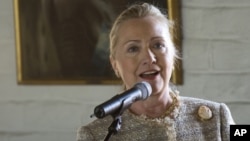OSLO, Norway - Russian President Vladimir Putin says his country is not supplying arms to the Syrian government to use against opponents. U.S. Secretary of State Hillary Clinton says Russian arms sales to Syria are of "serious concern" and could lead to civil war.
President Putin told German Chancellor Angela Merkel that Russia does not support any side in what he called an "extremely dangerous" situation in Syria. Following talks in Berlin, he said Russia "does not provide weapons that could be used in a civil conflict."
The Russian government has long defended its continuing arms sales to Damascus, saying President Bashar al-Assad's forces have the right to protect themselves against rebels that Damascus says are being supplied by Qatar and Saudi Arabia.
Secretary of State Clinton says Russian arms have helped President Assad withstand international pressure to step down after 15 months of violence.
"We know that there has been a very consistent arms trade even during this last year of violence in Syria coming from Russia to Syria. We also believe that the continuing supply of arms from Russia has strengthened the Assad regime," said Clinton. "What those arms are being used for we can not speak with any accuracy. But the fact that Russia has continued to sustain this trade in the face of the efforts by the international community to impose sanctions and to prevent further arms flowing to the Assad regime and in particular the Syrian military has raised serious concerns on our part."
Chancellor Merkel says she and President Putin both favor a political solution, with the work of U.N. and Arab League envoy Kofi Annan as a starting point. President Putin said he believes it is possible that Mr. Annan's mediation can work, but it requires what he calls "a certain level of professionalism and patience" warning that "nothing should be done with force and be expected to have an instant effect."
Secretary Clinton discussed the conflict in Syria with Norwegian government officials in Oslo Friday. She says "very strong opposition" from Russia is making it harder to put together an international coalition against President Assad.
"Their position of claiming not to take a position is certainly viewed in the Security Council, in Damascus, and elsewhere as a position supporting the continuity of the Assad regime," said Clinton. "And if Russia is prepared, as President Putin's remark seems to suggest, to work with the international community to come together to plan a political transition, we will certainly be ready to cooperate.
She says the United States is looking forward to finding a way to work with Russia to end the violence and support the Annan plan. Without Russian support, she says, Mr. Annan can not expand his mandate to push Damascus to confront what she calls terrible dangers in Syria.
President Putin told German Chancellor Angela Merkel that Russia does not support any side in what he called an "extremely dangerous" situation in Syria. Following talks in Berlin, he said Russia "does not provide weapons that could be used in a civil conflict."
The Russian government has long defended its continuing arms sales to Damascus, saying President Bashar al-Assad's forces have the right to protect themselves against rebels that Damascus says are being supplied by Qatar and Saudi Arabia.
Secretary of State Clinton says Russian arms have helped President Assad withstand international pressure to step down after 15 months of violence.
"We know that there has been a very consistent arms trade even during this last year of violence in Syria coming from Russia to Syria. We also believe that the continuing supply of arms from Russia has strengthened the Assad regime," said Clinton. "What those arms are being used for we can not speak with any accuracy. But the fact that Russia has continued to sustain this trade in the face of the efforts by the international community to impose sanctions and to prevent further arms flowing to the Assad regime and in particular the Syrian military has raised serious concerns on our part."
Chancellor Merkel says she and President Putin both favor a political solution, with the work of U.N. and Arab League envoy Kofi Annan as a starting point. President Putin said he believes it is possible that Mr. Annan's mediation can work, but it requires what he calls "a certain level of professionalism and patience" warning that "nothing should be done with force and be expected to have an instant effect."
Secretary Clinton discussed the conflict in Syria with Norwegian government officials in Oslo Friday. She says "very strong opposition" from Russia is making it harder to put together an international coalition against President Assad.
"Their position of claiming not to take a position is certainly viewed in the Security Council, in Damascus, and elsewhere as a position supporting the continuity of the Assad regime," said Clinton. "And if Russia is prepared, as President Putin's remark seems to suggest, to work with the international community to come together to plan a political transition, we will certainly be ready to cooperate.
She says the United States is looking forward to finding a way to work with Russia to end the violence and support the Annan plan. Without Russian support, she says, Mr. Annan can not expand his mandate to push Damascus to confront what she calls terrible dangers in Syria.




